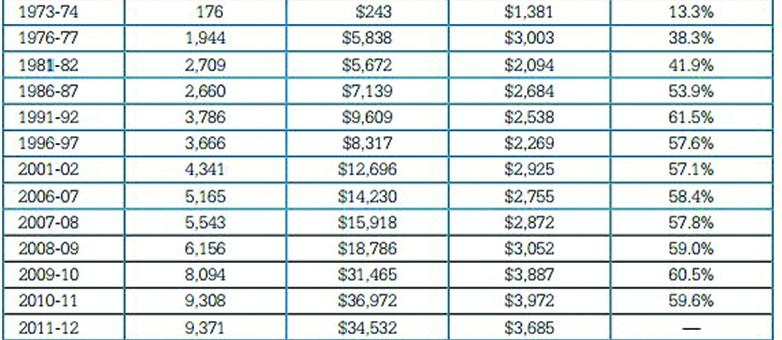Major changes to the Pell Grant system are being proposed in a report by the College Board Advocacy and Policy Center released in April.
Among the suggestions given by the “Rethinking Pell Grants” study group was to simplify the application process, which, according to the report, may be confusing and difficult to complete.
“Simplifying [the process] has been talked about for years,” said Kevin Multop, director of financial aid at Central Oregon Community College. “About half of student applicants have some sort of financial document that holds them up.”
Under the proposals, eligibility would be based on income over the past three years prior to applying. Personal earnings would be obtained directly from the Internal Revenue Service.
Currently the Free Application for Student Financial Aid requires the most recent tax information be provided by the applicant.
“It sounds great, but we may lose something,” Multop said. “The disadvantage would be that it is not the most recent information, it would be a trade off.”
 Also suggested in the report is an end to the limit of grant money per term, which tops out at 12 credits, and does not allow for grant money in summer term.
Also suggested in the report is an end to the limit of grant money per term, which tops out at 12 credits, and does not allow for grant money in summer term.
“[It would] be encouraging students to take more credits,” said Kathy Little, senior advisor of student aid policy at College Board. “It provides incentive to [complete] as rapidly as they can.”
Multop agrees that encouraging rapid completion “makes a lot of sense,” but he has seen the negative side-effects to such an approach.
“Students that should not be taking a full schedule are tempted to take a load that they may not be able to handle,” Multop said.
This need for change to an aging system comes with recognition of a shift in demographics, according to the report. In 2010-11, 59 percent of Pell Grant recipients were considered independent, 25 and older, compared to less than 38 percent in 1976-77.
“Things are quite different today,” Little said. “We want to make sure the dollars are spent as effectively as they can be.”
A key concern of the report is that these older students have different needs than younger students, often seeking occupational advancement through education.
“They know they want to better prepare themselves for the workforce,” Little said, “but they don’t know where to start.”
To counter this, the study group suggested advising tailored specifically for older students, including pre-enrollment guidance on local labor market trends.
“This would ensure that the student would arrive with the skills needed to succeed,” Little said. “Many adult students just don’t know where to turn for this sort of information.”
Despite the cost and scope of such sweeping changes, Little is hopeful that these ideas will be considered in the Reauthorize Higher Education Act that may come up in 2014.
“While our proposal is a big idea,” Little said, “we think pieces of it could be implemented.”
–Darwin Ikard
The Broadside
(Contact:[email protected])









